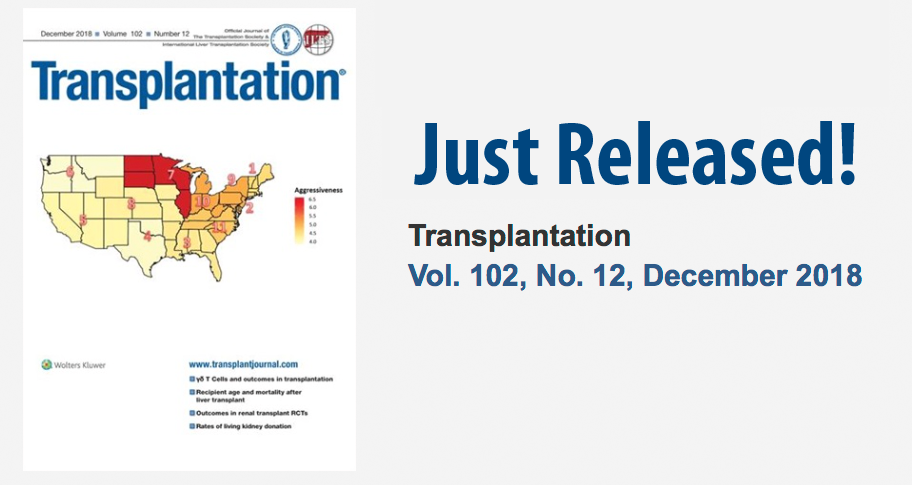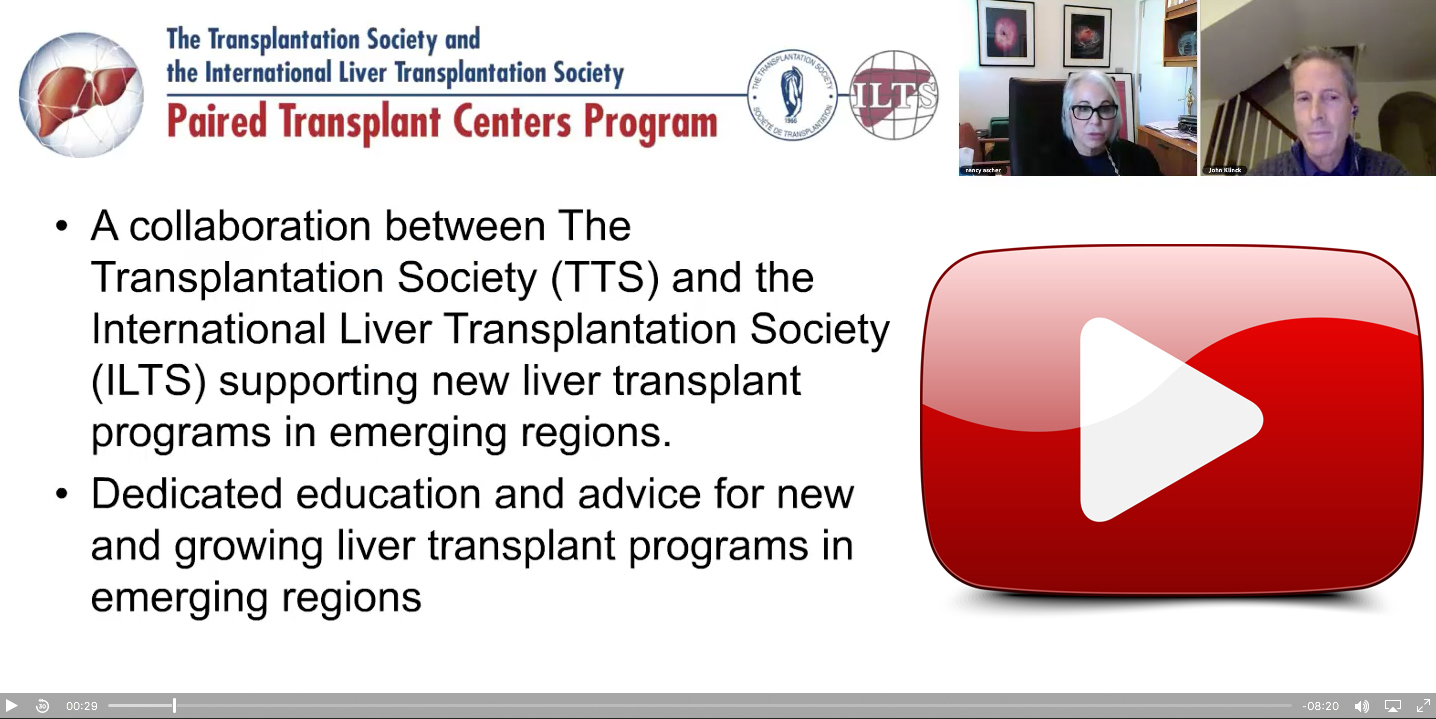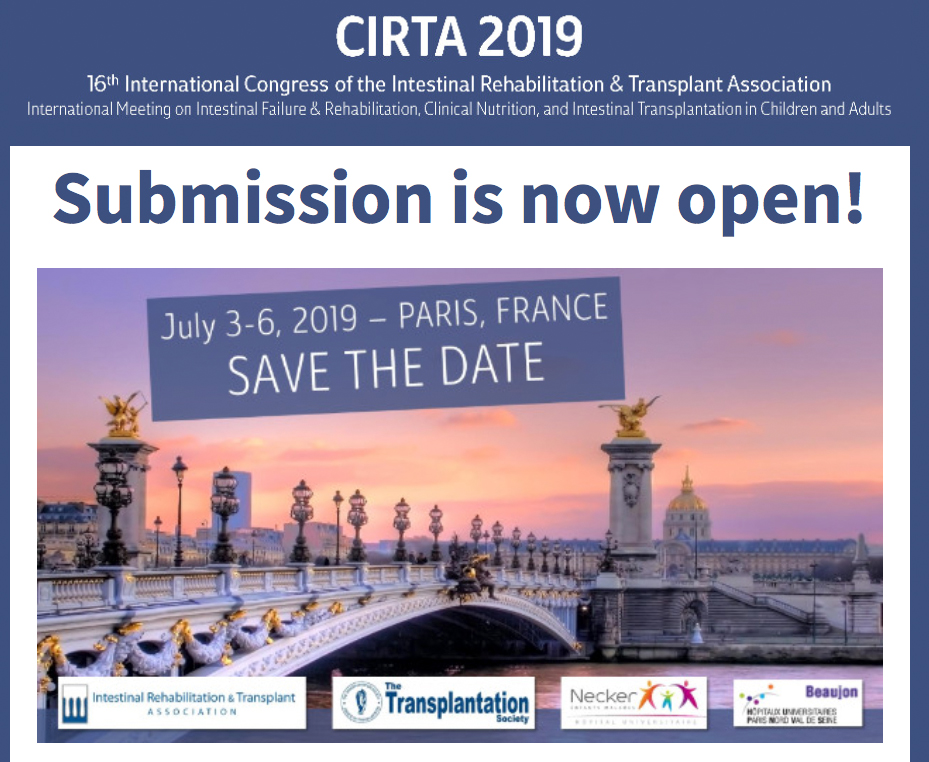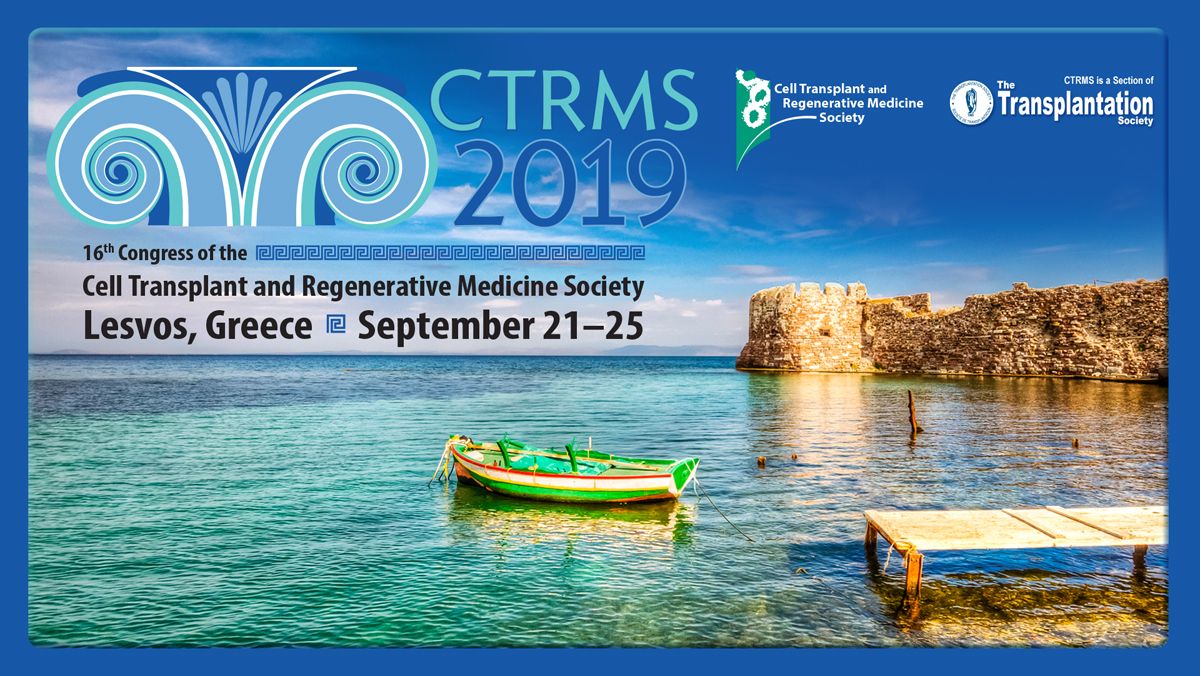
Just Released!
Transplantation Journal December Issue
This issue contains many fascinating papers for your Northern hemisphere winter reading, or summer vacation reading in the southern hemisphere. Important papers on: which outcomes are reported and which are not in renal transplant RCTs; who donates kidneys and who doesn't; two perspectives on outcomes of liver transplants in the elderly from Korean and UNOS data; the psoas as a predictor of cardiac transplant outcomes. There are many more highlights from: xeno to stem cells, antibodies to gamma delta T cells.
Registration and Housing is now open!
We are offering low registration fees, which are futher reduced for TTS, MESOT, TDTD or TOND Members, nurses and non physicians. Students may attend the meeting for free.
REMINDER: Abstract Deadline is December 3, 2018
TRANSPLANTATION DIRECT JOURNAL - HIGHLIGHTED ARTICLE
Dr Peri Husen, Editorial Fellow, Transplantation.
The Influence of Donor to Recipient Size Matching in Kidney Transplant Outcomes.
Arshad A, Hodson J, Chappelow I, Nath J, Sharif A.
Transplant Direct. 2018;4:e391.
In this population-cohort study, Arshad and coworkers analyzed deceased-donor kidney transplant outcomes stratified by donor-to-recipient size ratios in 11720 adult patients that were transplanted in the UK between 2013 and 2015. The aim of their study was to determine whether mismatching weight is an independent risk factor for poor outcome following deceased donor renal transplantation. The authors used weight as a surrogate marker for kidney size. Percentage weight difference in each transplantation was calculated as follows: (donor weight/recipient weight) × 100. The authors then stratified each transplantation into 1 of 3 groups: (1) <75% (small donor kidney), (2) 75%-125% (weight matched kidney), and (3) >125% (large donor kidney). Of all renal transplants analysed, n=1608 (13.7%) were defined as having transplanted a small donor kidney, n = 7247, 61.8% as having transplanted a weight matched kidney and n = 2865, 24.4% as having transplanted a large donor kidney. Primary outcome measures were patient and graft survival. Overall (P=0.876) or death-censored graft survival (P=0.173) did not differ between the three groups in multivariate analysis. When analysing patient survival, it was found to be significantly shorter in recipients of larger kidneys than those with weight matched kidneys (hazard ratio, 1.21; 95% confidence interval, 1.05-1.40; P= 0.009). Secondary outcome measures were rates of delayed graft function (DGF, defined as need for dialysis within the first week after kidney transplantation) and 12-month (or nearest time point) creatinine values following kidney transplantation. Rates of delayed graft function did not differ (P=0.396) between groups. However, 12-month creatinine levels were found to decline progressively across the groups (P < 0.001), being worst with adjusted averages of 144.2 μmol/L for recipients of small donor kidneys, 134.7 μmol/L in weight matched kidneys, and 124.9 μmol/L in recipients of large donor kidneys. This study sheds further light on the factors influencing outcome in adult kidney transplantation. However, when it comes to patient mortality further studies are in need.
In the News
Chicago Women in Transplantation Networking Dinner
Thank you for those who came out to the Chicago Women in Transplantation Networking Dinner on November 15th. This educational event was supported by Novartis and included 26 women from 4 different transplant centers in Chicago. Representatives from medicine, surgery, and research centers had a chance to meet and listen to Michelle Josephson, MD and Daniella Ladner, MD, MPH share honest accounts of their career stories and journeys. We wish to thank Anita Chong, PhD who represented Women in Transplantation and Anjana Pilai, MD and Helen S. Te, MD for their leadership in organizing this event. It was a great learning experience bringing together the Chicago transplant community to collaborate and network. For more information about future Women in Transplantation events, contact This email address is being protected from spambots. You need JavaScript enabled to view it..
35 kidney genes linked to chronic kidney disease risk
November 22 - An international study lead by University of Manchester scientists has discovered the identity of genes that predispose people to chronic kidney disease. The discovery is a major advance in understanding of the significantly under-diagnosed disorder which, if left undetected, can lead to failing kidneys that need dialysis or kidney transplantation.'
India - Foreign nationals seeking organ transplant have to be registered in the waiting list
November 22 - The Health Ministry has made it mandatory for foreign nationals seeking organ transplant in India to be registered in the waiting list of hospitals following reports claiming they were being given preferential treatment by some private institutions. “We won it because we developed a pre-operative method of 3D-printing of an adult human kidney in a baby’s abdomen to plan difficult transplantation in children. It’s a novel technology we’re using for operative planning in difficult cases, which is what the award recognises.
UK - IPTA Member Pankaj Chandak was among the UK Business Tech Award winners
November 23 - International Pediatriic Transplant Association Member Pankaj Chandak was among the winners who spoke of their delight at being recognised at London's exclusive Montcalm Marble Arch Hotel. “We won it because we developed a pre-operative method of 3D-printing of an adult human kidney in a baby’s abdomen to plan difficult transplantation in children. It’s a novel technology we’re using for operative planning in difficult cases, which is what the award recognises.
U.S. paper finds cannabis use has no effect on kidney transplant outcomes
November 22 - Within the next 10 years, the current population of 18- to 29-year-olds will be the largest group of living kidney donors
Drone successfully flies human organ transplant between hospitals
November 21 - For the first time, a human organ has been successfully transported between medical facilities by a drone. A team of scientists from the University of Maryland Baltimore used a research-qualified donor kidney as a test subject to shuffle back and forth on a remotely piloted hexacopter, testing the organ for changes throughout 14 flights. Its longest journey was 3 miles at a maximum speed of 40 mph, the duration and distance of which were suitable for demonstrating transportation between inner city hospitals.
Israeli researchers report that they have invented the first fully personalized tissue implant, engineered from a patient’s own materials and cells.
November 14 - The new technology makes it possible to engineer any kind of tissue implant, for the spinal cord, to the heart, or brain, from one small fatty tissue biopsy.
Careful Donor Evaluation Can Improve Alport Patients’ Kidney Transplant Outcomes
Novermber 19 - Kidney transplantation in those with Alport syndrome may have better patient and graft survival rates compared to patients with other causes of end-stage renal disease (ESRD). Available evidence also indicates that careful evaluation of potential donors, particularly for mutations in key Alport genes, is required.
Phillipines - National Transplant Ethics Committee (NTEC) Update
November 22 - The National Transplant Ethics Committee (NTEC) was created for the purpose of overseeing “ethical issues and dilemmas regarding organ donation and transplantation.” Such matters are apparently on the rise and it is a good thing indeed for people to be aware of the concepts and discussions surrounding this highly sensitive topic.
Predicting lower respiratory disease in transplant patients
November 19 - Parainfluenza virus (PIV) is an upper respiratory tract infection (URTI) than can progress to a more serious and often fatal lower respiratory tract disease (LRTD) in immunocompromised individuals. Hematopoietic cell transplantation (HCT) patients undergo immunosuppressive radiation or chemotherapy treatment prior to transplant and frequently acquire PIV following the procedure. However, the risk factors that predict progression from URTI to LRTD in HCT patients are undefined, complicating identification and prevention of LRTD.
TTS-ILTS PAIRED TRANSPLANT CENTERS PROGRAM
Deadline January 1, 2019
Watch Video Overview with Nancy Ascher(TTS) and John Klick (ILTs)
The TTS-ILTS Paired Transplant Centers Program is a collaboration between The Transplantation Society (TTS) and the International Liver Transplantation Society (ILTS) supporting new liver transplant programs in emerging countries.
Upcoming Meetings ANNOUNCEMENTS
CTRMS 2019 - SAVE THE DATES!
SEPTEMBER 21-25, 2019 - LESVOS, GREECE
Abstract Submission is now open!
Contact
+1-514-874-1717
This email address is being protected from spambots. You need JavaScript enabled to view it.
Address
The Transplantation Society
International Headquarters
505 Boulevard René-Lévesque Ouest
Suite 1401
Montréal, QC, H2Z 1Y7
Canada






